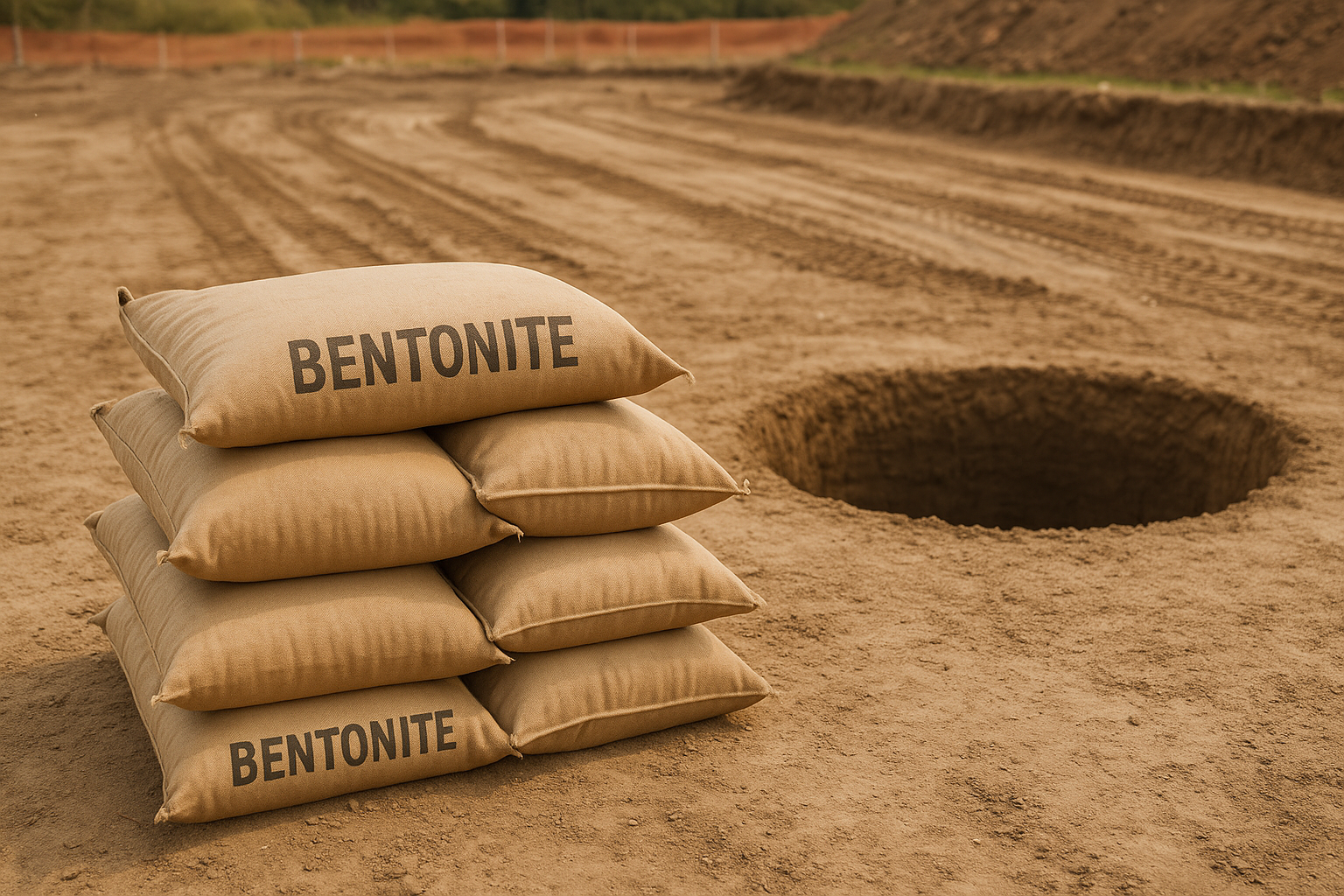When embarking on drilling operations, whether for water wells, foundation piles, or geotechnical investigations, one critical question emerges: how many bentonite bags are required for a 1-meter bore? This calculation directly impacts project costs, timeline, and operational efficiency. Understanding the precise requirements for bentonite consumption helps construction professionals plan better and avoid costly delays.
The answer isn’t straightforward, as it depends on several factors including bore diameter, soil conditions, drilling method, and the specific grade of bentonite used. In this comprehensive guide, we’ll explore everything you need to know about bentonite bag requirements for 1m bore depth across Indian construction scenarios.
Understanding Bentonite and Its Role in Drilling Operations
Bentonite, a naturally occurring clay mineral primarily composed of montmorillonite, serves as the backbone of drilling fluid systems. This versatile material transforms ordinary water into a stable, viscous drilling mud that performs multiple crucial functions during boring operations.
The primary functions of bentonite in drilling include borehole stabilisation, cutting removal, formation damage prevention, and equipment cooling. When mixed with water, bentonite creates a protective filter cake on borehole walls, preventing collapse and maintaining structural integrity throughout the drilling process.
High-quality bentonite, such as that produced by established manufacturers like CMS Industries, ensures optimal performance in challenging geological conditions. The company’s ISO 9001:2015 certified manufacturing facilities in Gujarat produce over 9,000 metric tons of bentonite powder monthly, meeting diverse industrial requirements across India.
Factors Affecting Bentonite Bag Requirements for 1m Bore
Bore Diameter and Volume Calculations
The fundamental calculation begins with determining the bore volume. For a cylindrical bore, the volume equals π × radius² × depth. A 150mm diameter bore extending 1 meter deep requires approximately 17.7 litres of drilling fluid, while a 300mm diameter bore demands roughly 70.7 litres.
However, actual bentonite consumption exceeds theoretical calculations due to fluid loss, circulation requirements, and safety margins. Industry standards typically recommend maintaining 1.5 to 2 times the theoretical volume in active circulation.
Soil Conditions and Geological Factors
Different soil types significantly impact bentonite bag requirements for 1m bore depth. Sandy soils with high permeability consume more bentonite due to increased fluid loss. Conversely, clayey soils require less bentonite but may demand specific additives for optimal performance.
Rock formations present unique challenges, often requiring modified bentonite formulations. Fractured rock zones can lead to substantial fluid loss, necessitating additional bentonite bags to maintain circulation.
Drilling Method and Equipment
The drilling technique directly influences bentonite consumption. Rotary drilling methods typically require continuous circulation, increasing overall bentonite usage. Percussive drilling may use less bentonite but demands higher viscosity fluids for effective cutting removal making it essential to source quality material from trusted oil drilling bentonite manufacturers & exporters in India.
Modern drilling equipment with efficient circulation systems can reduce bentonite waste, optimising the number of bags required for each meter of bore depth.
Standard Bentonite Bag Requirements: Industry Guidelines
Typical Consumption Rates
Based on industry experience and technical specifications, standard bentonite bag requirements for 1m bore depth typically range from 0.5 to 2.5 bags per meter, depending on bore diameter and conditions. For smaller diameter bores (100-200mm), expect 0.5 to 1 bag per meter. Medium diameter bores (200-400mm) generally require 1 to 1.5 bags per meter, while larger diameter bores (400mm+) may need 1.5 to 2.5 bags per meter.
Mixing Ratios and Concentrations
Professional drilling operations typically use bentonite concentrations ranging from 4% to 8% by weight. A standard 25kg bentonite bag mixed at 6% concentration produces approximately 400-450 litres of drilling fluid, sufficient for most 1-meter boring operations in favourable conditions.
The optimal mixing ratio depends on formation characteristics and desired fluid properties. Experienced drilling contractors adjust concentrations based on real-time field conditions, ensuring efficient use of bentonite bags.
Calculating Bentonite Bags for Specific Bore Dimensions
Step-by-Step Calculation Method
To determine bentonite bags required for 1m bore, follow this systematic approach:
First, calculate the theoretical bore volume using the formula V = π × r² × h, where r is the radius and h is the depth (1 meter).
Next, apply a safety factor of 1.5-2.0 to account for circulation losses and operational requirements.
Then, determine the required bentonite concentration based on soil conditions (typically 4-8% by weight).
Finally, calculate the number of bags needed based on the standard 25kg bag weight and desired concentration.
Practical Examples and Case Studies
Consider a 200mm diameter bore extending 1 meter deep in medium-density sandy soil. The theoretical volume is 31.4 litres, but with a safety factor of 1.8, the required fluid volume becomes 56.5 litres.
Using a 6% bentonite concentration, this requires approximately 3.4kg of bentonite, translating to roughly 0.14 bags. However, accounting for mixing losses and circulation requirements, one 25kg bag would be adequate for this specific application.
Quality Considerations and Bentonite Specifications
Importance of High-Grade Bentonite
The quality of bentonite significantly impacts consumption rates and overall project success. Premium-grade bentonite, such as that manufactured by CMS Industries, offers superior yield and performance characteristics, potentially reducing the total number of bags required for 1m bore operations.
High-yield bentonite typically produces 15-20% more drilling fluid per bag compared to standard grades, directly translating to cost savings and improved operational efficiency.
Technical Specifications for Indian Conditions
Indian geological conditions demand specific bentonite characteristics including high swelling capacity, excellent filtration control, and thermal stability. Quality manufacturers ensure their products meet stringent API and IS standards, guaranteeing consistent performance across diverse drilling applications.
The montmorillonite content, typically exceeding 85% in premium bentonite, directly correlates with fluid performance and ultimately affects the number of bags required for each meter of bore depth.
Cost Analysis and Economic Considerations
Budget Planning for Bentonite Requirements
Accurate estimation of bentonite bags required for 1m bore enables precise budget planning. With bentonite prices varying based on grade and supplier, understanding consumption patterns helps optimise procurement strategies.
Consider bulk purchasing advantages when planning multiple boring operations. Established suppliers often offer volume discounts, reducing per-bag costs for large-scale projects.
Cost-Benefit Analysis of Premium vs. Standard Bentonite
While premium bentonite commands higher prices, its superior performance characteristics often justify the investment. Reduced consumption rates, improved drilling efficiency, and minimised operational delays can offset initial cost differences.
Calculate the total cost per meter of bore, including labour, equipment, and material costs, to make informed decisions about bentonite grade selection.
Best Practices and Recommendations
Storage and Handling Guidelines
Proper storage ensures bentonite maintains its performance characteristics. Store bags in dry, ventilated areas, elevated from ground contact to prevent moisture absorption. Rotate stock regularly, using older inventory first to maintain product freshness.
Mixing and Application Techniques
Achieve optimal results by following proper mixing procedures. Add bentonite gradually to vortexing water, ensuring complete hydration before use. Allow adequate mixing time (15-30 minutes) for full activation of bentonite properties.
Monitor fluid properties throughout drilling operations, adjusting bentonite concentration as needed to maintain optimal performance characteristics.
Troubleshooting Common Issues
Excessive Bentonite Consumption
If bentonite bag requirements exceed calculations, investigate potential causes including formation instability, equipment inefficiency, or improper mixing procedures. High fluid loss formations may require specialised additives to reduce bentonite consumption.
Inadequate Fluid Performance
Poor drilling fluid performance despite adequate bentonite quantities often indicates quality issues or improper preparation. Verify bentonite specifications and mixing procedures to ensure optimal results.
Conclusion
Determining the precise number of bentonite bags required for 1m bore depends on multiple factors including bore diameter, soil conditions, drilling method, and bentonite quality. While general guidelines suggest 0.5 to 2.5 bags per meter, specific project requirements may vary significantly.
Successful drilling operations require careful planning, quality materials, and experienced execution. By understanding these fundamental principles and working with reliable suppliers like CMS Industries, construction professionals can optimise bentonite consumption while maintaining superior drilling performance.
For complex drilling projects or specialised applications, consult with experienced bentonite suppliers who can provide technical guidance and customised solutions. Their expertise ensures efficient material utilisation and project success across diverse Indian construction scenarios.
Contact CMS Industries today to discuss your bentonite requirements and benefit from their extensive experience in manufacturing high-quality drilling fluids for Indian construction projects.
Frequently Asked Questions
Q1: What is the average number of bentonite bags required for 1m bore in Indian soil conditions?
Typically, 0.5 to 2.5 bentonite bags are required per meter of bore depth, depending on diameter and soil conditions in Indian construction projects.
Q2: How does bore diameter affect bentonite bag requirements?
Larger bore diameters require proportionally more bentonite bags. A 100mm bore needs approximately 0.5 bags per meter, while 400mm+ bores may require 2+ bags per meter.
Q3: Can poor-quality bentonite increase bag consumption for 1m bore?
Yes, low-grade bentonite requires higher consumption rates due to reduced yield and performance characteristics, increasing overall project costs and material requirements.
Q4: What factors increase bentonite bags required for 1m bore depth?
Factors include sandy soil conditions, fractured rock formations, high groundwater levels, larger bore diameters, and inefficient drilling equipment increasing bentonite consumption rates.
Q5: How should bentonite bags be stored for optimal performance in boring operations?
Store bentonite bags in dry, ventilated areas elevated from ground contact, maintaining temperature control and rotating stock regularly to preserve material quality and performance.







